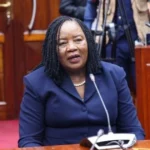The Kenya Kwanza brigade under their presidential candidate William Ruto is expected to tackle plans regarding the revival of the Kenyan economy that they allege to have been interfered with by the “handshake government”, in the upcoming debate.
Kenyan eyes will be directed at tomorrow’s July 26, hefty presidential debate, at the Catholic University of Eastern Africa (CUEA) main campus in Karen, Nairobi from 4:00 pm to 10:00 pm., as the country draws closer toward the August 9 poll.
According to the Kenya Kwanza manifesto launched on June 30, 2022, Kenyans anticipate seeing how applicable the pledges are on the ground should they win the upcoming general election.
![Deputy President William Ruto in a past event. File : [Courtesy]](https://news.switchtv.ke/wp-content/uploads/2022/07/ruto-elections-1024x941.webp)
Reminiscence of Ruto speaking at Kasarani, where he said that among the key challenges that will confront his administration include an unemployment rate that is estimated at over 50%; an economy highly dependent on low productive agriculture (around 30% of GDP) with high susceptibility to drought; rising energy and food prices that are now beyond the reach of many Kenyans; and about half of Kenyans now living below the poverty line (2019 estimate), worsened by the pandemic.
“In addition, managing and making devolution (work) effectively, fostering national unity and meeting the elevated expectations of citizens under a newly elected president who signifies a change from a top-down economic regime structure to a bottom-up.”
“This will have important implications for Kenya’s future economic and social conditions,” he said.
Subscribe to our YouTube channel at Switch Tv
He said Kenya Kwanza’s plan is a bold step in transforming the economy to achieve durable growth while maintaining macroeconomic stability and empowering the people at the bottom of the pyramid, the “hustlers.”
According to him, trickle-down economics does not work because the “free market” is not free, or fair; it is rigged for the privileged, captured, and monopolized by cartels.
He said the trickle-down model rewards capital more than labour, big businesses more than small ones, and incumbents more than startups.
“Trickle-down economic model has failed because personal interests override the public interest when selective interest in policy and legislation supersedes the common good. It is based on the assumption that the market is properly governed and regulated. But most often, the market is captured by cartels, driving it to monopolistic and duopolistic tendencies, “said Ruto.
He said the bottom-up economic model is a people-driven, deliberately inclusive, participatory process where citizen participation is at the core of policies, strategies, programs, and projects.
“By ensuring a consultative and participatory process involving citizens in identifying their key socio-economic priorities, it ensures that government work meets people’s needs, that public policy is relevant, and that government works for the people,” he said.
Ruto said during Kenya Kwanza’s bottom-up economic dialogue in the 47 countries that they had anchored their manifesto on five pillars that include Agriculture and Food Security, MSMEs and Financing, Housing, Health Access, and ICT and Creative Economy.
According to the presidential debate schedule, Ruto was set to face off with his opponent Raila Odinga before the Azimio faction revealed that their candidate Raila won’t appear in the debate.
On the other hand, Roots party presidential candidate George Wajackoyah will show down with his colleague from the Agano party David Waihiga Mwaure.


![UDA presidential candidate William Ruto. File: [Courtesy]](https://news.switchtv.ke/wp-content/uploads/2022/07/Ruto-22-1024x576.webp)













